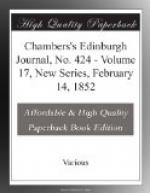Something of this might have been in my face, as I offered my sick companion some small attention—I forget what—gathering up one of her luxurious trifles, or arranging her cushions. She seemed almost to read my thoughts as her eyes rested on my melancholy face; and saying abruptly: ‘I fear you are unhappy, young man?’ she settled herself in her place like a person prepared to listen to a pleasant tale.
‘I am unfortunate, madam,’ I answered.
‘Unfortunate?’ she said impatiently. ’What! with youth and health, can you call yourself unfortunate? When the whole world lies untried before you, and you still live in the golden atmosphere of hope, can you pamper yourself with sentimental sorrows? Fie upon you!—fie upon you! What are your sorrows compared with mine?’
‘I am ignorant of yours, madam,’ I said respectfully; ’but I know my own; and, knowing them, I can speak of their weight and bitterness. By your very position, you cannot undergo the same kind of distress as that overwhelming me at this moment: you may have evils in your path of life, but they cannot equal mine.’
’Can anything equal the evils of ruined health and a desolated hearth?’ she cried, still in the same impatient manner. ’Can the worst griefs of wayward youth equal the bitterness of that cup which you drink at such a time of life as forbids all hope of after-assuagement? Can the first disappointment of a strong heart rank with the terrible desolation of a wrecked old age? You think because you see about me the evidences of wealth, that I must be happy. Young man, I tell you truly, I would gladly give up every farthing of my princely fortune, and be reduced to the extreme of want, to bring back from the grave the dear ones lying there, or pour into my veins one drop of the bounding blood of health and energy which used to make life a long play-hour of delight. Once, no child in the fields, no bird in the sky, was more blessed than I; and what am I now?—a sickly, lonely old woman, whose nerves are shattered and whose heart is broken, without hope or happiness on the earth! Even death has passed me by in forgetfulness and scorn!’
Her voice betrayed the truth of her emotion. Still, with an accent of bitterness and complaint, rather than of simple sorrow, it was the voice of one fighting against her fate, more than of one suffering acutely and in despair: it was petulant rather than melancholy; angry rather than grieving; shewing that her trials had hardened, not softened her heart.
‘Listen to me,’ she then said, laying her hand on my arm, ’and perhaps my history may reconcile you to the childish depression, from what cause soever it may be, under which you are labouring. You are young and strong, and can bear any amount of pain as yet: wait until you reach my age, and then you will know the true meaning of the word despair! I am rich, as you may see,’ she continued, pointing to her surroundings—’in




